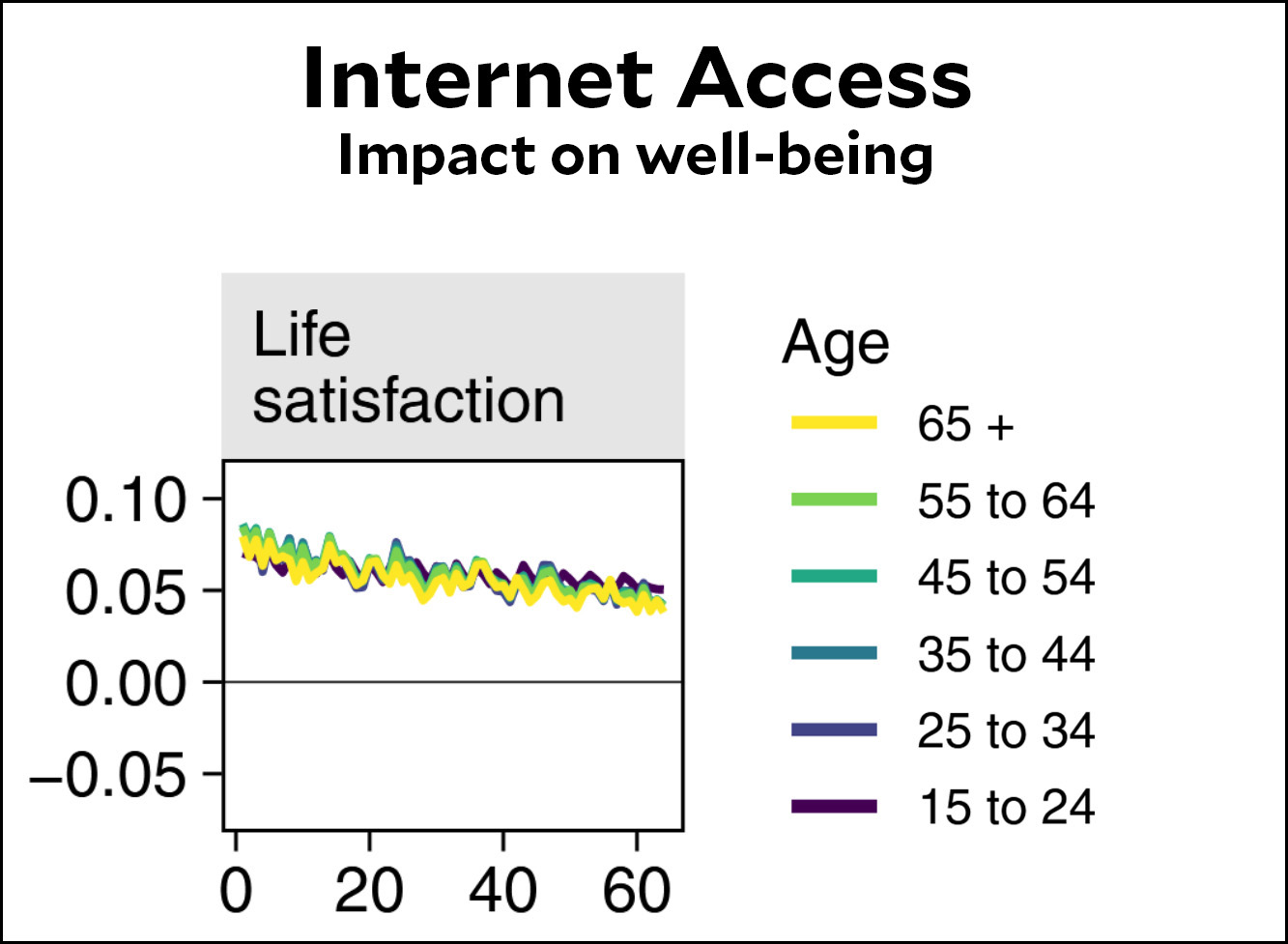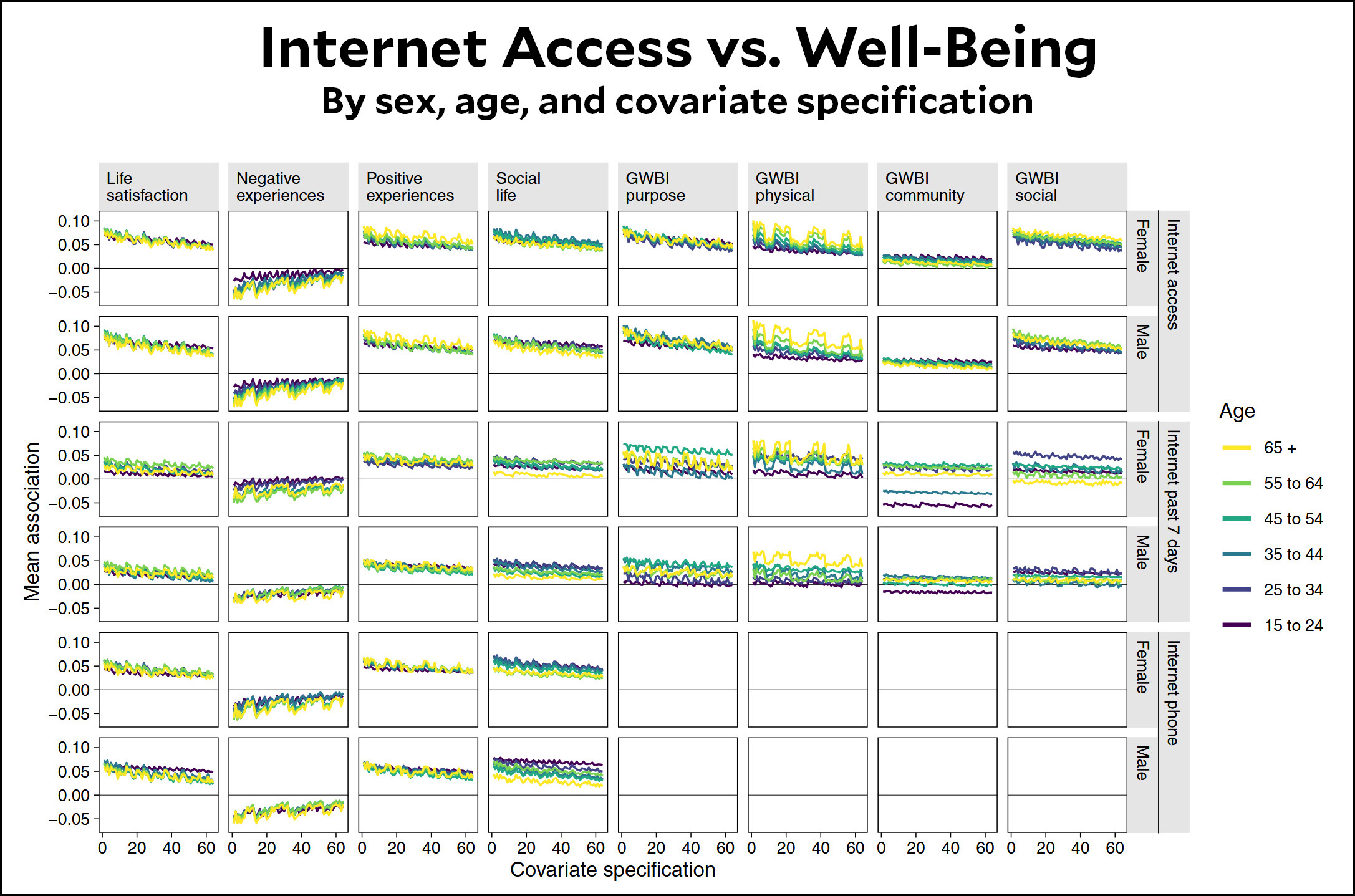A recent study has taken a broad look at the effect of internet use on personal well-being. It finds that, generally, both internet access and use make people happier and better off on a wide variety of social metrics.
My first thought was, "Duh, richer people have better internet access and richer people are also happier. Big deal." However, as in most cases when something obvious occurs to you, it's a good bet that the researchers who spent months on their study also thought of it. And they did. In fact, they took into account income, education, and several other possible confounders. They ended up with six possible confounders, and therefore 64 separate model specifications depending on which ones they turned on and off.
Are you with me so far? Here's a close-up of one particular comparison. This is for (a) females asked about (b) life satisfaction compared to (c) internet access.
What you see is a bunch of squiggly lines, one for each age band. The lines are made up of points that show the correlations for each of the 64 possible model specifications:
 The important thing to notice here is that the line is always above zero. For this particular test, internet access has a positive outcome for every age group no matter what model specification is used. The more stuff you control for, the smaller the effect, but it's always well above zero.
The important thing to notice here is that the line is always above zero. For this particular test, internet access has a positive outcome for every age group no matter what model specification is used. The more stuff you control for, the smaller the effect, but it's always well above zero.
So now you're ready for the whole result. Buckle your seat belts:
 This shows results for men and women, across eight different measures of well-being, and for three different measures of internet access.
This shows results for men and women, across eight different measures of well-being, and for three different measures of internet access.
Generally speaking, the results are positive for everything. The main exception is the measure of negative experiences, which we want to be below zero. The only other exceptions are for young people, especially women, on a measure of community well-being vs. actual internet use over the previous week. There are a few other lines that just touch zero—i.e., the effect of internet access is neutral—but that's it.
Now, these measures of well-being are taken from a Gallup poll, so they aren't especially well-studied or validated. Nonetheless, they're worth something, and the study examines more than 2 million people across 168 countries. I would be interested in a follow-up that zooms in on just rich countries and, in particular, on just the US.
POSTSCRIPT: For what it's worth, this is a more sophisticated version of the crude comparison I made a couple of months ago using the World Happiness Report. My results were similar: I found that at a country level, internet penetration is positively associated with happiness.

I would die without the internet.
US Dollar 2,000 in a Single Online Day Due to its position, the United States offers a plethora of opportunities for those seeking employment. With so many options accessible, it might be difficult to know where to start. You may choose the ideal online housekeeping strategy with the vx-12 help of this post.
Begin here>>>>>>>>>>>>>> https://requireaccess06.blogspot.com/
It's a library and people you can connect with at any time of day and ask almos any question of.
No more getting lost, you have maps, directions, suggestions, other people to ask.
You always have almost any recipe at your fingertips.
There's instructions for almost everything, tutorials to do all sorts of things written or video.
And there's chat rooms and reading or video or games to entertain you and fill social needs.
Of course it's a net positive everywhere.
Even populated with kissy bots, it's definitely a good thing.
Everyone needs their own kissy bot.
BUT HOW WILL WE HAVE OUR MORAL PANIC ABOUT TEENAGERS AND SOCIAL MEDIA NOW?
Well, it leads to a breakdown in local community which isn't great for teens who need training wheels on their bikes and on their communities.
But it does give a chance for small communities to be able to reach out to larger ones and support their neurodiverse, queer, and others who aren't being supported or can be supported with local experience.
I have been pondering what form of technology/website/webapp would best serve a local community. How might we use the internet to help them connect to each other rather than fracture? (Assuming that's the good thing I imagine it to be.)
I don't really know. How do you have a local news webfeed/site/thingy? My old, very small town, once had a once-a-week newspaper, which is dead now. What could replace it?
Right now what's "replacing" it is Facebook. Which really is not a good answer.
Whatever it is, needs strong moderation lest it become the bullying ground of local nazis and cranks.
Absolutely. Honestly, a "letters to the editor" format might be better, rather than a standard comment section.
I love how Kevin went WAY beyond what the authors of the study themselves claimed. In fact, they gave several caveats to their paper in the discussion section but Kevin decided to ignore them because they didn't fit his preconceived notions.
For example, here's what the authors said about income and other confounding vaiables:
"There are likely myriad other features of the human condition that are associated with both the uptake of internet technologies and well-being in such a manner that they might cause spurious associations or mask true associations. For example, because a certain level of income is required to access thei internet and income itself is associated with well-being, any simple association between internet use and well-being should account for potential differences in income levels. While we attempted to adjust for such features by including various covariates in our models, the data and theory to guide model selection were both limited."
Kevin: Hey, they did something with income so we're all good.
Sigh...
As someone who publishes peer reviewed papers, I would place a bet that this paragraph was requested by a reviewer who had criticisms of the authors’ approach to correcting for income, so the authors threw in a catch-all set of caveats.
"Duh, richer people have better internet access" is only true up to a fairly low income level. I'm comfortably middle class, not rich by any stretch, and I have fiber to home service at 300 mbps. That service level cannot meaningfully be improved on for any amount of money.
You can, for money, make it into the Gbps range, but that's sometimes in the 'lay your own fiber' realm. 300 Mbps is really good.
I have a car with a top speed of about 130 mph, which is considerably faster than I ever drive. A rich person can buy a car with a top speed of nearly 300 mph, but that doesn't mean he can actually go faster on the highway than me. The same applies to the internet. 300 mbps is more than I can use; more speed would not be a meaningful improvement
Supreme Court in a quandary. Declaration of Independence says pursuit of happiness, but Constitution doesn't mention Internet, or net neutrality. What to do when when challenges to recent FCC regs reach them?
Pingback: Cell phones really don’t seem to be causing an epidemic of teen depression – Kevin Drum